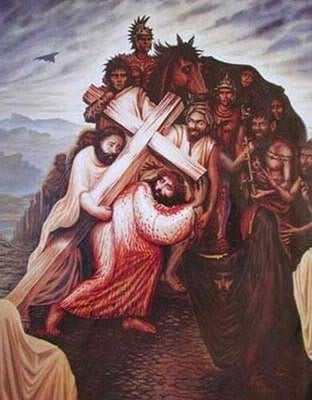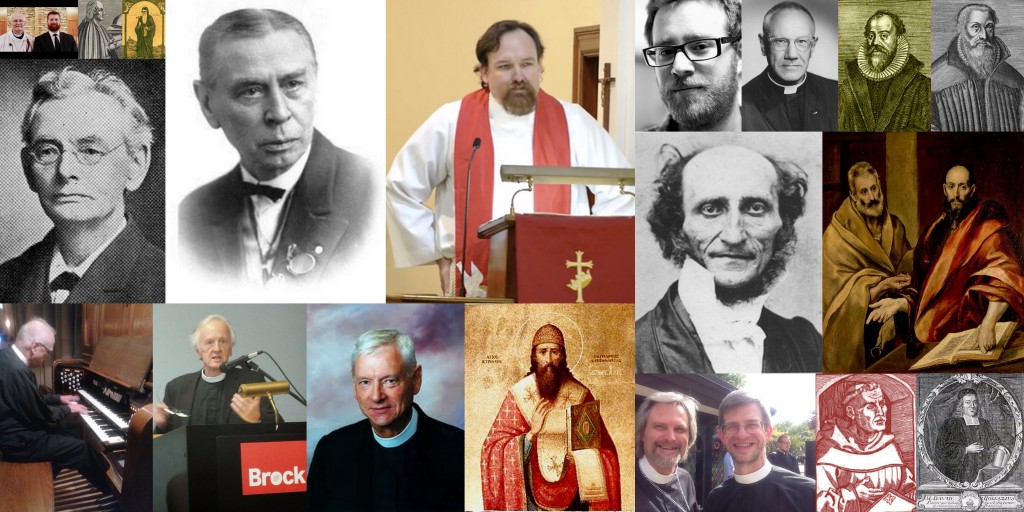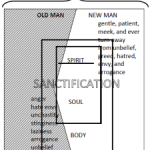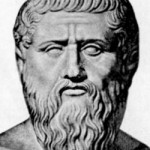This post is a slightly highly modified version of a comment I made on an article by T. R. Halvorson, “My Plea: Recognize Theosis,” featured on the Brothers of John the Steadfast site. The conversation in the comments has been both civil and worthwhile. I highly recommend perusing the dialogue if you would like to learn more about this topic.
What follow are my thoughts on the original post and, moreover, on the broader topic it raised: theosis, or “the divinization of man.”
+ + +
PROLEGOMENA
starting in medias res…
This piece by Rev. Dr. Eric Phillips, pastor of Concordia Lutheran Church in Nashville, TN, “Answering Some Questions About The Term ‘Theosis'” offers some helpful and concise clarifications.
Full disclosure, Rev. Rossow—I am the “Sven” with whom you have had words on this blog in past months. My name is Trent Demarest, and I am a friend of Rev. Jordan Cooper. I work for Just & Sinner Publications, and I am an editor on the Just & Sinner site. I lived with Pr. Cooper and his family for two months this summer before heading off to Concordia Lutheran Theological Seminary in St. Catharines, ON, whence I am currently writing. Now my ulterior motives are on the table…
Somewhat less relevantly, Dr. Phillips is my cousin. OK, now all of my ulterior motives are out on the table…

T. R., my problem with your piece is that you lump together several things that you dislike and then make highly tenuous connections between them. This strikes me as odd for several reasons. For example, I’ve been an extremely vocal opponent of FiveTwo since long before the Wiki14 boondoggle. At the same time, I have (somewhat humorously) been referred to as “a Cooperite”, called a pietist, been spoken of as being part of “Cooper & Co.”, etc.—you know, the usual.
In short, I most definitely hold to the conviction that sanctification is not simply positional (in statu), but a real foretaste (in re) of the divinization/glorification/deification which God has promised to believers in the final state, i.e., after the Resurrection.
However, it seems from your article that it is precisely this soteriological realism per se (i.e., what you call “belief in theosis”) that makes people like me and Pr. Cooper part of the current plague of “mysticism” that is impeding the General Effort. In the introduction to your piece you write:
Despite what seems to be a dizzying array of ideas and movements that undermine, erode, or outright displace justification, really, there is a single thread running through them: theosis. When we see this single thread, we can be nimble in defending the flock. […] We’ll be looking at theosis in Eastern Orthodoxy, Roman Catholicism, Osiander, Finnish School Lutherans, the Emerging Church, Trinitarian Theology or the Perichoresis Movement, the FiveTwo network, Jordan Cooper’s Christification, the Holiness Movement, and Pietism.
This is a premise which you do not even adequately define, let alone prove. In brief, it does not seem like you have done your homework when you list “[Pr.] Jordan Cooper’s Christification” with the likes of the Emerging Church, FiveTwo, the Perichoresis Movement, et al as all equally belonging to a cadre of “ideas and movements that undermine, erode, or outright displace justification.” Then again, I suppose this just makes you like everyone else whose evaluative approach to Pr. Cooper’s work has been on the order of “ready, fire, aim.” Anyway, I guess we’ll just have to agree to disagree as to whether this move on your part was fair, logically valid, or rhetorically legitimate.
In any event, you would at the very least need to cite some concrete examples from Pr. Cooper’s book in order for anyone to know what you’re really objecting to. Let’s see some text. Let’s not have any more vague allusions on the order of “I feel like Y when Z says or writes X,” or, “some people might think Y when Z says X.” If Z is teaching false doctrine, then reproduce the unsound pattern of words for all to see. Put it out in the open.
If, on the other hand, Z is simply using language that you think is unclear, provide actual examples of how people are being misled into false thinking. Otherwise, be patient enough to work through the material of Z’s argument. Put the best construction on it. Ask for clarification. Don’t pull a Donavan Riley and neglect to cite any specifics, or even any text, in your representation of someone you disagree with. (If you’re reading this, Rev. Riley, I’d like to remind you that you still owe Rev. Cooper an apology for your libelous “review” of his first book.)
“CHRIST OUR RIGHTEOUSNESS” AND THE UNIO FIDEI FORMALIS
Rev. Rossow, you write:
It all hangs on the definition of “image of God.” Walther and the rest of the Lutheran church fathers define the image of God as righteousness. And so we are in violent agreement with you that the preaching of the forgiveness of sins sets us free from sin, death and the devil to live a new, sanctified life in the righteousness of God.
This is all true, but it raises as many questions as it answers, for “righteousness” is not an abstract nominal predicate; rather, “righteousness” is Christ Himself, for Christ is the Image of God (cf. Colossians 1:15). The Father looks upon the perfect obedience of Christ—His perfect life and His innocent suffering and death—and resurrects Him, thereby declaring Him righteous. Why does the Father declare Christ righteous? Because He is righteous. He doesn’t become righteous when the Father declares that He is.
Where are “you” in all of this? Well, if St. Paul is to be believed, you are in Christ through baptism (cf. Romans 6:3-5), dying and rising, just as you once were in Adam, sinning in the garden and incurring wrath (cf. Romans 5:12). This “being in Christ” is the formal union of faith (unio fidei formalis). In faith Christ’s righteousness covers you like a garment. In faith Christ enfolds you within Himself in such a way that you are one with Him without ceasing to be yourself. Thus Doctor Luther writes:
Christ, therefore, saith he, thus joined and united unto me, and abiding in me, liveth this life in me which now I live; yea Christ Himself IS this life, which now I live. Wherefore Christ and I in this behalf are both one. This union or conjunction, then, is the cause that I am delivered from the terror of the law and sin, am separate from myself, and translated unto Christ and His kingdom, which is a kingdom of grace, righteousness, peace, life, salvation and eternal glory. Whilst I thus abide in Him and dwell in Him, what evil is there that can hurt me? (Great Galatians 2:20; 1535)
“This union…is the cause.” The cause of what? Of being delivered from the terror of the law and sin, or being separated from oneself, and of being translated unto Christ and His kingdom. Sure sounds like justification to me. Note well that this is not mystical union (unio mystica) that is being spoken of here, but faith. And not merely an aspect or part of faith, but faith itself: faith is union with Christ (unio fidei formalis); it is not mere relationality towards God. To wit, Luther again:
As concerning justification, Christ and I must be entirely conjoined, and united together, so that He may live in me and I in Him. And this is a wonderful manner of speech. Because Christ liveth in me, look now what grace, righteousness, life, peace and salvation is in me, it is His, and yet it is mine also, by that inseparable union and conjunction which is through faith by the which Christ and I are made as it were one body in spirit. (Ibid.)
This union is the instrumental cause, i.e., it is not the basis of our receiving the imputation of Christ’s righteousness, but rather the means through which this blessed exchange takes place. The impulsive cause is the will of God, i.e. … election. Yep. Election. It’s a Lutheran doctrine. But it’s not the topic of this paper, so let us quickly abscond, ducking fruit as we run…
The Father declaring us righteous on account of our being-in-Christ-our-Righteousness is not even remotely similar to Him declaring us righteous on account of an abstract “divinity” within us. That is the Osiandrian error. The problem with Osiander was that his understanding of the unio fidei formalis was almost Nestorian, for he held that the believer could commune with the divinity of Christ apart from His humanity, and on account of that communion and the renewal resulting therefrom, be declared righteous.
But the surprising thing about Osiander’s error is easily missed: it was actually a weak conception of union that made his position heretical. George Fields’s clarification (from this piece: “Distinguo brevis – Mannermaa, Osiander, and Eastern Orthodoxy”) is most helpful:
[T]he Formula does not condemn Osiander’s soteriological realism, but rather it condemns Osiander on two points: firstly, that Osiander taught that Christ’s presence in us is only according to the divine nature, and not according to both, as Lutheran Christology would demand (this topic would be dealt with at length in Chemnitz’s De Duabus Naturis in Christo), and secondly, that Osiander found that logical “reason” for our justification to be found not in the judgment upon Christ qua Mankind on the cross, but upon our inner renewal through the indwelling of Christ. The problem of Osiandrianism is that of “who is the Father looking at when He declares ‘not guilty’”? Is He looking at you with the divine nature renewing you from within (an idea which seems almost a Lutheranized form of Catholicism’s “infused grace”), or is He looking at Christ as the first and fullness of a new humanity?

George is a wicked smart guy. And when I say “wicked”, I don’t mean, like, actually wicked, but I mean it like the way New-Englanders use it. Which is more meaningful, I think. He is a fine theologian and will be a blessing to the Church as a pastor. But he didn’t come up with this himself. He got it from Rev. Dr. David Scaer:
Narrow justification down to the one person of Jesus whom God finds and declares as righteous (Acts 3:14-15) and in this declaration he incorporates all of humanity. In raising Jesus from the dead, God found him righteous, and in that one act God found all of humanity righteous in him (1 Cor 15:22). Jesus, as the second, greater, and true Adam, possessed all of humanity in himself. So if all sinned in the first Adam and were condemned to death, how much more shall life and resurrection be given to all in the greater Adam, in and from whom God constituted a new humanity. (“Flights from the Atonement”; CTQ 72 [2008]: 203)
That is a real Lutheran reading of justification. It ain’t no legal fiction. Now, will somebody please get Bishop Tom Wright on the short-wave?
TWO KINDS OF EXTRA NOS
It’s certainly true to say that Christ’s righteousness is extra nos because it is outside of us. But it is outside of us because we are in Christ. Think of the image of the iron rod thrust into the fire. Is the fire outside the iron (extra ferrum)? Sure is. The iron positively glows with fire. When you look at the iron, you see fire, and you declare, “This iron is fiery.” And indeed it is. The iron and the fire are said to be in union with each other.
Yet the profounder truth which is communicated by the phrase extra nos is not the mere locative aspect of Christ’s righteousness with respect to the believer, but where the righteousness comes from. In the metaphor of the iron rod in the fire, where did the fire come from? Not from the iron. So, too, with us: we can’t come up with the righteousness to justify ourselves—not before conversion (when, besides our inability, we have no desire), and not after conversion (“I have the desire to do what is right, but not the ability to carry it out” Romans 7:18ff). It’s not even that at any given point we’re “not righteous enough”; no, righteousness coram Deo is a zero-sum game: on our own merits, we’re not righteous. Full stop. We are credited with Christ’s righteousness. It comes to us from outside of us.
So, yes, Christ and His righteousness are extra nos in the sense of being outside of us, but even when He is outside of us with His righteousness, His righteousness is inside of us, too. To wit, Luther writes in Two Kinds of Righteousness (LW 31:297ff):
Through faith in Christ, therefore, Christ’s righteousness becomes our righteousness and all that he has becomes ours; rather, he himself becomes ours. … This is an infinite righteousness, and one that swallows up all sins in a moment, for it is impossible that sin should exist in Christ. On the contrary, he who trusts in Christ exists in Christ; he is one with Christ, having the same righteousness as he. It is therefore impossible that sin should remain in him. This righteousness is primary; it is the basis, the cause, the source of all our own actual righteousness. For this is the righteousness given in place of the original righteousness lost in Adam. It accomplishes the same as that original righteousness would have accomplished; rather, it accomplishes more.
…
Therefore this alien righteousness, instilled in us without our works by grace alone–while the Father, to be sure, inwardly draws us to Christ–is set opposite original sin, likewise alien, which we acquire without our works by birth alone. Christ daily drives out the old Adam more and more in accordance with the extent to which faith and knowledge of Christ grow. For alien righteousness is not instilled all at once, but it begins, makes progress, and is finally perfected at the end through death.
All righteousness, whether extrinsic or intrinsic, is extra nos. For Christians there’s never a point at which Christ is only outside of us, but not inside of us, as well. Thus when Luther talks about the union of faith, he’s still talking about “extra nos righteousness”: we didn’t effect the union; we didn’t take Christ to ourselves; we did not choose Him, but He chose us. The only positive relation to Christ whatsoever is faith, and in faith Christ is completely present, as Luther writes:
This is the true faith of Christ and in Christ, through which we become members of His body, of His flesh and of His bones (Ephesians 5:30). Therefore in Him we live and move and have our being (Acts 17:28). Hence the speculation of the sectarians is vain when they imagine that Christ is present in us “spiritually,” that is, speculatively, but is present really in heaven. Christ and faith must be completely joined. We must simply take our place in heaven; and Christ must be, live, and work in us. But He lives and works in us, not speculatively but really, with presence and with power. (LW 26:357)
So far the formal union of faith.
But what’s Christ doing in us “with presence and with power”? Is he just hanging out? Is He flexing for us so we can see how strong He is? Are we “fellowshipping”? No. Here’s another unsubtle Gen-Y allusion to help us all out:
Christ is not only located “extra nos” because sin is not only located “extra nos”, in the form of defective relationality: no; it is a poison residing in the very depths of our souls. Sin is not simply “willful disrelatedness to the risen Lord”, pace Barth. Let the reader understand: it was not simply our “relationship” with God that was damaged by the Fall, but our very nature itself. At this point it’s piquant to note that the popularizer of vogue “Radical Lutheranism,” the late ELCA theologian Gerhard O. Forde, rejected this view, calling it a “theology of glory.” According to Forde, Adam’s sin did not constitute a “fall” (which he regarded as an “unbiblical notion”); rather it was just Adam being himself. To do justice to the enormity of this view would take a separate post—and I’m writing one. Suffice it to say for now that calling this view “un-Lutheran” would be a colossal understatement; it isn’t even Christian.
As orthodox confessional Lutherans, we confess that in Adam’s sin we corrupted God’s good creation. We desecrated His temple. We defiled ourselves at the level of our essence. Thus the relationship and the damaged nature must both be restored, in that order: “[T]he first thing which Christ must do in the sinner is to forgive him his sins,” Walther proclaims, “For no one can atone for his sins himself and make them right.” Amen and amen! “However,” he goes on…
…if Christ did no more with sin but forgive it, He would not be a perfect Savior. If He would leave men in sin, He would also leave them then in unhappiness. True blessedness of necessity means that sin actually is abolished, wiped out, crushed and destroyed in us.
Dr. Walther recognized that sin was not merely relational, but ontological, as well; so, too, salvation is not merely relational, but ontological, as well. Human nature must be cleansed. And thanks be to God, it is being cleansed! Christ is making us more like Himself, which is the way we were supposed to be from the beginning.
Do not misunderstand—”like unto” is not “same as”; no one is positing an equivocation between potter and clay here. But we were indeed reborn in the laver of regeneration, infused with the breath of life, and the Spirit is transforming us out of the Old Adam into New Men—not in such a way that the Old Adam or the Flesh is destroyed, but in such a way that it is changed or converted (cf. FC SD II:81f). This change is not simply a behavioral or existential phenomena, nor is it relationally defined; it is as substantial and ontological as the Incarnation itself.
DISAMBIGUATION:
THEOSIS & THEOPOIESIS;
UNIO FIDEI FORMALIS & UNIO MYSTICA
Contra Osiander, the interior renewal which is accomplished in us by Christ is not the basis for our justification. But that doesn’t mean that it isn’t happening, or that it is somehow unimportant. Should we spend our time navel-gazing, “fruit-checking”, and growing anxious about our “progress in holiness”? No. Frankly, that would be pietistic. Will it always—or ever, even—be plainly evident beyond a shadow of a doubt that Christ is renewing us? No. But Scripture does say that it will be evident to our neighbor. We may not feel the refiner’s fire—or, rather, we may feel only the fire but not its blessed result—yet still and all, we have a sure promise of God that this renewal is occurring. Let God be true, and every man a liar.
Rev. Rossow, again, you write with regard to all of this…
This is not theosis.
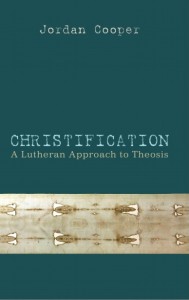
You’re right. Sort of. The indwelling of Christ technically brings about theopoiesis (which is the term actually used in the oft-cited dictum of St. Athanasius in De Incarnatione 54.3, the patristic proof-text for theosis). Theosis is the endgame, the telos, “the whole enchilada”, as Dr. Phillips puts it. “Thou hast made us for Thyself, O Lord,” writes St. Augustine, “and our hearts are restless til they find their rest in Thee” (Confessiones I, i).
If anything, the term “Christification” as it is used by Pr. Cooper tracks more directly to theopoiesis, which is often what is actually meant by theosis in its colloquial use, at least in my experience. Christification is a very Lutheran term, though, better than either Greek term for our purposes, because it puts the focus right where it should be—not just on God, but on God-in-Christ for us. As Christians we are now being Christified, i.e., credited with His righteousness and conformed to the likeness of Him as our elder brother, having been chrismated with the same Spirit of sonship in Holy Baptism (cf. Romans 8:15, 2 Corinthians 3:18, Ephesians 4:13, Hebrews 2:11).
Basically, “theopoiesis” is just another way of saying renovation, renewal, or sanctification (cf. Conrad Lindberg; “stricte dicta”, i.e., transitive sanctification). It occurs through the Word and the Sacraments, through the daily remembrance of our baptism, and (I would go so far as to say) through our vocations, which God uses to crucify the Old Adam in us and conform us to Christ’s likeness. There is an active component on our parts in this, of course, as St. Paul’s exhortations throughout his epistles amply show. (And his exhortations do not only show us our sin, but they also direct us actually to do certain things—it may not be a purely “informatory use of the Law”, but…it’s still informatory.) In our vocations we give ourselves in sacrificial service to our neighbor, which the Holy Spirit leads and enables us to do (cf. FC SD II).

Unlike the formal union of faith, which is stative, the mystical union is transitive, i.e., it is happening, ongoing, being effected, progressing in us more and more. And we do cooperate in this union. Or, we don’t—and for the record, if we don’t, that’s a bad thing: in the same way that we can lose our salvation, i.e., destroy our faith, by unrepentant sinning, so, too, we can hinder, retard, and eventually even destroy the mystical union.
This is where it really becomes clear that the mystical union grows out of the formal union of faith, which goes to demonstrate that they’re two expressions of one union. There can only be one union, really, because there is no division in Christ. Even though the two kinds of union are logically distinct from each other, to destroy one is to destroy both. And we do possess that awful freedom. Does this scare you? It scares me. But it doesn’t scare me as much as this sermon by C. F. W. Walther on the necessity of working together with God after conversion.

To say that all of this takes place in our mystical union with Christ is actually a lot less esoteric than it sounds. “Mystical” just means “mysterious.” No big lexicographical deal. We Lutherans are hypersensitive to any word containing the root “myst-” because of Adolf Köberle’s trifecta of baddies— mysticism, moralism, and rationalism—popularized by Dr. Gene Veith’s fine little book, The Spirituality of the Cross. Köberle’s formulation is entirely appropriate and helpful. At the same time, it seems especially prone to abuse, getting taken up by every Lutheran who can read as though it were the magical three-pronged churchkey capable of opening every theological door. And, well…it’s not. But I digress.
There is in fact some justice to the allegation that we Lutherans are “the mystical Protestants.” Why? Well, for starters, we have the sacraments. Sacramentum is the Latin translation of the Greek mysterion, which means “mystery.” Mystical does not equal mysticist.
UNION IN THE LORD’S SUPPER
How, then, does the mystical union actually transpire in us? All of the Lutheran one-two combo punches work: The Law and the Gospel. The Word and the Sacraments. Confession and Absolution. God does it. As Dr. Norman Nagel would say, He’s the one “running the verbs.” Phenomenologically, though, your liberated will is involved. Because you can’t do nothing. It’s actually impossible. Think about it.
Let’s consider a specific example, however, since it was raised, and since it is so central to our faith and piety: the Lord’s Supper.
Rev. Rossow, you write:
There is no “divination” [sic] of man although there is the mysterious reception of his body and blood in our tummies. That is a mystery I cannot explain but it is not the same as theosis.
Let’s just set your words in apposition with a few quotations from our Lutheran fathers. Primacy of honor goes, of course, to Luther:
To give a simple illustration of what takes place in this eating: it is as if a wolf devoured a sheep and the sheep were so powerful that it transformed the wolf and turned him into a sheep. So, when we eat Christ’s flesh physically and spiritually, the food is so powerful that it transforms us into itself and out of fleshly, sinful, mortal men makes spiritual, holy, living men. (This is My Body, AE 37:101)
Holy sheep-wolves, Batman! That sure sounds like divinization to me. What does it sound like to you?
Here’s Chemnitz:
Therefore, in order that we might be able to lay hold on Christ more intimately and retain Him more firmly, not only did He assume our nature but He also restored it again for us by distributing His body and blood to us in the Supper, so that by this connection with His humanity, which has been assumed from us and is again communicated back to us, He might draw us into communion and union with the deity itself. (The Lord’s Supper, p. 188)
“Communion and union with the deity itself.” This is powerful language. Finally, Johann Gerhard:
Theology takes its name from God: first, by reason of its principal effective cause, that is, that it is a divinely revealed teaching; second, and indeed especially, by reason of its subject or object, that it makes men divine or “partakers of the divine nature.” (On the Nature of Theology and Scripture, p. 27)
Thus this Holy Supper will transform our souls; this most divine sacrament will make us divine men, until finally we shall enter upon the fulness of the blessedness that is to come, filled with all the fulness of God, and wholly like Him. (Sacred Medtiations XX)
It is inescapably clear from the foregoing quotations that these men believed, taught, and confessed that in the Lord’s Supper a mingling of Christ’s nature with ours takes place, such that ours is changed, but His is not. Put a little differently, when the Body and Blood of Christ are “in our tummies”, as you put it, they do indeed divinize us. No, we are not thereby assumed into divinity (what a friend calls “Divine apophagy”); we do not become Divinity (the same as God); we become divine (like God). The distinction between creature and creator is not erased, nor can it be.
Like other food, the Body and Blood of Christ “become us”; unlike other food, they communicate the incorruptible life of Christ to our sinful flesh, converting us ever more into New Men. It is definitely not the case that the Body and Blood of Christ are just hanging out in our digestive tracts and then passing through us, leaving us no different than before. Whatever would be the point? Simply paying mind to the Lord’s mandates to “do this” and “take and eat” as though they’re some deontological imperatives? Such a Zwinglian view is wholly alien to our richly incarnational Lutheran sacramentology. So, too, the estimation of the Supper as an instance of Divine speech-act, an “event” where God “addresses” you. This truncated gloss of the Lord’s Supper is the ugly lovechild of philosophic modernism (specifically post-Kantian analytical philosophy) and crass Law/Gospel reductionism. Comparing it to the Lutheran fathers’ rich teaching regarding the sacrament is like comparing an email to sexual intercourse.
CONCLUDING THOUGHTS
Christ Himself is our Righteousness. His righteousness is not a figment of God’s imagination. The question is not whether we must be in union with Christ to be saved. We must be. Is our union with Christ is effected and sustained by man or by God? By God’s gracious working alone. Does our union consist in an active habitus of love or the pure passivity of faith? In faith alone. And true faith is not a relationship of mere apposition, but of communion. We are fools if we think we can regard the category of union as a mere modus loquendi, one which could be equalled or even surpassed by others.
To think this way as Lutherans would be to alienate ourselves from the thought of our principal theologians, to commit the primary error of historicism by thinking that they were simply a product of their time. If the relational ontology of post-Kantian metaphysics is just as good as the substance ontology which has been the handmaiden of theology for two millennia, then I suppose we should feel free to rewrite the Nicene Creed. If the former is actually superior, being in fact “more Christian”, as has been suggested by some modernistic Lutheran theologians, then I suppose we actually have an obligation to do so. I will not be joining anyone in this venture.
I am currently researching the intermixture of the “post-Kantian milieu” with Lutheranism, the results of which I hope to publish at some point. For now I will simply say that anyone even slightly familiar with post-Kantian philosophy should recognize how deeply inimical it is to orthodox Christianity, especially in its implications for the First Article of the Creed. The inroads which it has made in contemporary Lutheranism are frankly astounding.
So I will close with this: I for one am very appreciative for the work of Rev. Jordan Cooper, Rev. Dr. Eric Phillips, and others like them who see the vital place of union with Christ in Lutheran soteriology. That they are by no means innovators in speaking the way they do could not be more abundantly clear. If we neglect the robust confession of union with Christ which animated the thought of our Lutheran fathers, we will slowly but surely list into the miserable corner occupied by the sectarians and their distant noumenal God. Lord deliver us from such a fate.
+SDG+

